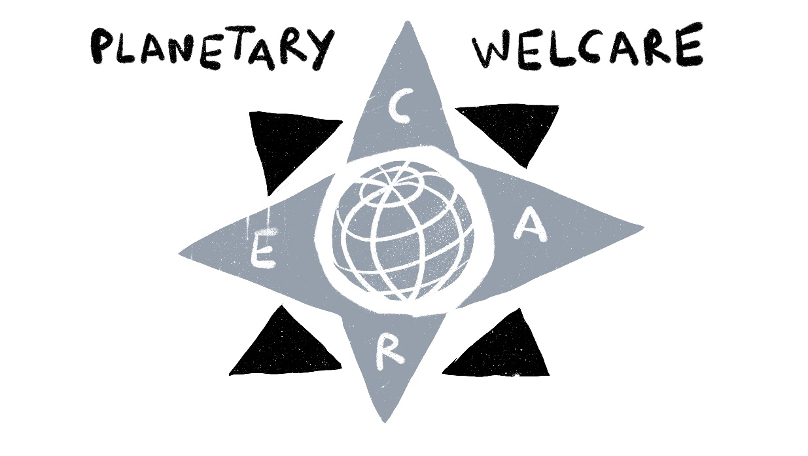- March 2024

TRADE Hub researcher and UNEP-WCMC’s Head of Policy, Thiago Kanashiro Uehara, recently published a paper titled “Planetary Welcare Principles for Just and Sustainable Futures: A Compass for System Change, Trade Reforms, and Transformations.” In it, he challenges conventional sustainable trade and environmental, social, and governance frameworks and introduces the Planetary Welcare Principles, shaping a compass for equitable, sustainable, and just global futures. Associate Communications Officer, Jemima Brennen, explores the rethinking of economic priorities in the global arena.
Introduction
In the ever-evolving landscape of international trade, there is an argument to be made to shift from a welfare-state model to a “Welcare state”. This transition involves re-evaluating economic priorities, particularly through the lens of Planetary Welcare, a comprehensive framework that emphasises justice, equity, and sustainability. With inspiration from Thiago Uehara’s paper, we will delve into the what the Planetary Welcare approach is, and how two institutions the World Trade Organisation (WTO) and the International Fair Trade Charter (IFTC) currently address elements of Planetary Welcare differently.
What is Planetary Welcare?
The Planetary Welcare approach introduces five fundamental principles—Well-being, Consumption, Accountability, Rooted Globalism, and Environmental Stewardship—aimed at guiding policy discussions and catalysing transformative change. Departing from traditional welfare-state models, the Planetary Welcare state emphasises a global perspective, integrating mechanisms for cross-border responsibility, accountability, and solidarity. It is a departure from the nationalistic viewpoint, and focuses on universal well-being and planetary health rather than limiting concerns within distinct national borders.
In a Planetary Welcare economy, well-being is multidimensional, encompassing not only material wealth but also aspects like safety, emotional health, and community well-being. The framework promotes sustainable lifestyles by balancing consumption across communities, regions, and generations. Accountability is a cornerstone, advocating for transparent accounting practices that trace the impacts of global value chains, aligning with Sustainable Development Goal (SDG) 16 on justice. Rooted globalism reconciles international agreements with place-based policymaking, allowing diverse trade systems and aligning with cultural diversity conventions. Finally, environmental stewardship is foundational, emphasising a harmonious relationship between humanity and the natural world, aligning with environmental SDGs and recognizing a healthy environment as a human right.
Embracing these principles collectively is pivotal for achieving planetary health, justice, and sustainability. The Planetary Welcare compass underscores a transformative journey toward these goals, emphasising the critical role of governmental agencies in initiating policy dialogues and evaluating current economic and trade systems.
Analysing High-Level Strategies
The World Trade Organisation (WTO) and the International Fair Trade Charter (IFTC), as two contrasting players in the global trade arena, exemplify differing approaches to Planetary Welcare. The WTO, operating under binding agreements, prioritises the interests of nation-states and major trade entities. In contrast, the IFTC, representing the fair-trade movement, champions fairness, equity, and the well-being of marginalised entities, including small-scale producers and artisans. Though they are players fulfilling different roles in the trade space, both recognise the important role trade can and does play in improving livelihoods. Using the Planetary Welcare compass, we can shed light on the varying degrees to which each institution integrates and prioritises the principles of justice, well-being, and environmental sustainability.
WTO’s Shifting Stance
The WTO, historically focused on procedural principles and a rule-bound interpretation of fairness, has undergone notable shifts. The appointment of a new Director-General in 2021 marked a departure from its traditional strategy. Acknowledging the challenge of integrating “sustainable development” with growing demand and trade, the WTO has expressed a commitment to improving the welfare of people worldwide. However, these steps towards a more sustainable WTO, are not necessarily in line with the well-being and environmental principles of the Planetary Welcare compass.
The WTO saw a change in leadership with a renewed emphasis on improving global welfare, offers potential for addressing non-economic aspects of life satisfaction. The organisation seems to recognise the importance of well-being and environmental principles, but these principles do however remain peripheral to their core strategy, presented as secondary considerations rather than central goals. The push for a universalised trade system raises concerns about diversity and place-based policymaking, while the focus on procedural fairness may undermine equitable outcomes.
IFTC’s Holistic Goals and Advocacy
Published by the World Fair Trade Organisation (WFTO) and Fairtrade International, the IFTC presents a holistic approach to trade. Aligned with most Planetary Welcare principles, the IFTC emphasises poverty eradication, inequality reduction, and sustainable livelihoods. Its advocacy for citizen engagement in trade policy and a place-based, multi-level approach sets it apart from the WTO. The IFTC strives to involve citizens in rewriting trade rules, ensuring diverse and resilient systems that prioritise local needs over a top-down global market approach. The IFTC, does however, fall slightly short in addressing consumption in an adequate manner. It highlights the need to decrease energy consumption and waste, but it doesn’t address how geographically skewed our consumption habits are, with the global North using more fuel, land, and water compared to the global South. By applying the Planetary Welcare principle of Consumption, the IFTC could more accurately represent and advocate for effective policy by tackling overconsumption where it is present.
Conclusion
The cases of the WTO and the IFTC show how even vastly different trade institutions can benefit from re-evaluating trade-related strategies in alignment with Planetary Welcare principles. For the WTO, adopting a Planetary Welcare approach entails a fundamental shift toward ensuring fair outcomes, prioritising well-being, and balancing these goals with its traditional role in facilitating trade and fostering economic growth. The IFTC, already mostly aligned with Planetary Welcare ideals, can deepen its commitment to inclusion, equity, and balanced consumption.
As the global community faces challenges of unsustainable production and consumption practices, interdisciplinary thinking becomes crucial for transformative change. Initiating collaborative pilot programs and establishing diverse forums for stakeholder engagement are essential steps toward fostering inclusive, equitable, and sustainable trade-policy development on a global scale.